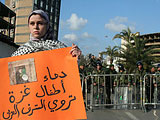Arab League Fudges Key Issues
By Dominic Moran for ISN
Another Arab League summit has come and gone with little apparent progress on easing fraught regional tensions and in addressing key issues of more direct popular relevance.
This week's Doha meeting saw an obsessive discursive focus on the need for healing extant rifts between Arab states. The prospects for genuine progress in fomenting reconciliation were always minimal and it seemed participants were happy to see the attention deflected to the peripheral issue of the indictment of Sudanese President Omar al-Bashir's on war crimes and crimes against humanity charges.
Host Qatar has played a mediating role between Khartoum and the rebel Justice and Equality Movement (JEM) and was clearly keen to secure the presence of the Sudanese leader at the summit.
In need of international backing for his government, al-Bashir chose to buck the advice of a key Sudanese religious body not to attend the Doha parlay and was rewarded with an open embrace by Arab leaders. Qatar is not a signatory to the Rome Statute that established the International Criminal Court (ICC) so the trip to the Gulf was fairly low-risk for al-Bashir.
Often under fire from abroad over their own domestic rights records, League states were not about to trigger a genuine debate on the merits or otherwise of the ICC charges or to entertain a discussion on the finer points of the Darfur crisis. The plenum sufficed with calls for peace and reconciliation within Sudan while openly demanding the cancellation of the arrest warrant. It was left to invited guest UN Secretary General Ban Ki-Moon to salvage some modicum of respectability for proceedings through his denunciation of the Sudanese government's decision to expel aid groups working in that country.
While signaling a seeming lack of belief in Doha concerning prospects for the revival of the JEM-Khartoum peace process, Qatar also appeared to use the al-Bashir invite as a means to send a shot across the bows of the US and EU states, demonstrating the possibility of Arab diplomatic independence on other issues of greater import to regional security.
The League succeeded in tamping down divisions on a key potential flashpoint, the Israeli-Palestinian conflict, preventing a crisis over the maintenance of the Arab League Peace Initiative (API ) in the face of the establishment of a hard-right government in Israel.
Supporting member states won ongoing adherence to the API from Syria and Qatar, arguing that the US should be given time to demonstrate a commitment to genuine change in its policies on the Israeli-Palestinian conflict and towards Arab states in general.
The final summit communiqué was notably bereft of any set date for re-evaluation of the API despite talk of a limited timeframe for Israeli acceptance.
Arab nations are under no illusions that Israel will address their peace offer. However, allowing the API to stand creates a diplomatic win-win as it may act to encourage dissensus between the Barack Obama administration and Netanyahu government.
Syrian President Bashir al-Assad called for new mechanisms and strategies in seeking peace with Israel in his speech to the plenum but did not seek to foment a crisis on the API, allowing the recent warming of his country's relations with initiative genitor Saudi Arabia to continue.
Comic relief was again provided by Libyan leader Muammar al-Qaddafi, who walked out of a summit session after deriding Saudi King Abdullah as a British product and US ally. Libya hosts next year's summit.
As always with Arab League summits, questions remain. What was achieved? Was any real effort made to implement the body's intended role as an institutional support for expressing the popular will for Arab unity and providing the mechanisms whereby member states can reconcile?
In summarizing the summit's achievements, League head Amr Moussa fudged his answer to a journalist's question on the latter, speaking of an ongoing process of reconciliation without giving any real indication that the League is prepared or indeed able to play a more fundamental role in regional crises.
It is unclear whether the League summit played any role in promoting what is perhaps the most interesting contemporary regional diplomatic transition: the progressive rehabilitation of Syria. The impact of this on Saudi, Egyptian, US, European and allied Lebanese interests and on the Syrian-Iranian relationship could be substantial, despite efforts by Damascus to reassure Tehran over its intentions.
Egypt perhaps has the most to lose. Through President Hosni Mubarak's decision to skip the Doha summit, Cairo clearly signaled its intention not to bury the hatchet with Syria or Qatar. The Egyptian media has been sharply critical of Qatar, deriding its regional diplomatic role, after Doha hosted a conference that sharply criticized Arab states' response to the Gaza conflict in January. This was interpreted in Egypt as a direct assault on the president's personal leadership and the country's peace treaty with Israel.
The League summit again emphasized the need for Palestinian inter-factional reconciliation without any apparent effort to establish a League role therein.
The Iranian nuclear challenge and regional arms race appear to have received short shrift despite significant efforts on the part of some member states to create a balancing military and nuclear capacity.
While the focus of media reportage on the Doha summit has been on the amelioration or otherwise of diplomatic rifts, it is perhaps more important that there was little apparent discussion in Doha of the ongoing socio-economic challenges facing the region in light of the world financial meltdown. The pressing need for reform, both of the League itself and member state governance, bureaucratic and judicial systems, were also, predictably, not discussed.
Likewise, an open, constructive dialogue on the key issues of political Islam, militancy, sectarian divisions, poverty alleviation and the correct channeling Gulf aid to promote crisis management, peace and stability still appears beyond League members.

